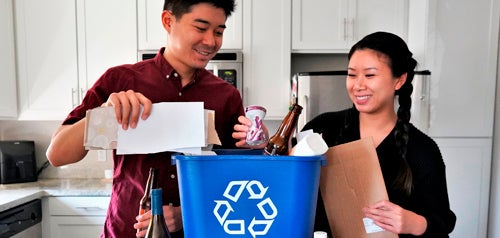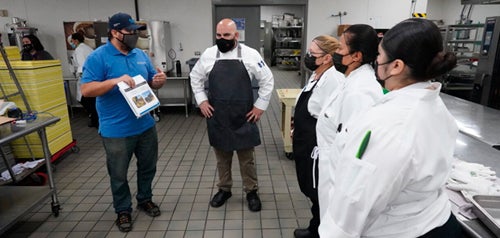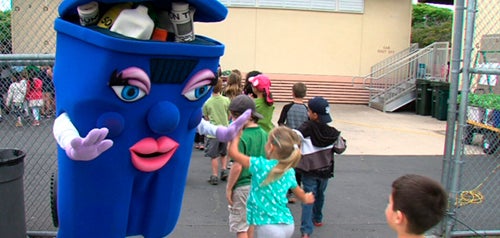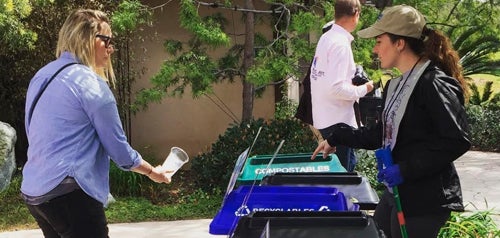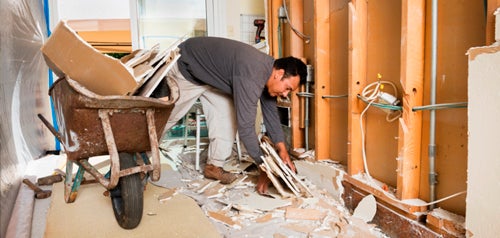TEST Recycling Programs
Environmental Services provides tools, resources and services to help with the City of San Diego's waste reduction and recycling efforts.
Recycling Requirements
- California Senate Bill 1383 (SB 1383) - Learn about new food and yard waste rules
- Recycling Ordinance - Learn about San Diego's new recycling requirements and resources
- California Assembly Bill 1276 - Learn about new restrictions on providing utensils and condiments at food facilities in the County of San Diego Department of Environmental Health guidance document.
- Container and Signage Guidelines
- Construction & Demolition Recycling Ordinance
- Single Use Plastic Reduction Ordinance
Recycling Resources, Signs and Guides
WasteFreeSD
WasteFreeSD is a regional directory to help residents find places that can repair broken items or accept donations of unwanted items. The directory also lists locations that accept bulky items and appliances for reuse, recycling or disposal. Visit WasteFreeSD.org for more information.
City of San Diego What Goes Where Guides
- What Goes Where? - English
- ¿Dónde coloco los artículos? - Spanish/Español
- Saan Mapupunta ang mga Bagay? - Tagalog
- Để vào đâu? - Vietnamese/Tiếng Việt
- What Goes Where? Special Holiday Edition - English
¿Dónde coloco los artículos? Edición Navideña - Spanish/Español
Để vào đâu? Phiên bản ngày lễ - Vietnamese/Tiếng Việt
Videos
The Curbsider
- Curbsider - ESD's recycling newsletter
Curbside Organic Waste Recycling Program Publications
Curbside Organic Waste Recycling Program Guide
- Curbside Organic Waste Recycling Guide English
- Guia de Reciclaje de Residios Organicos Spanish/Español
- Patnubay sa Pagre-recycle ng Organikong Basura Tagalog
- Hướng Dẫn Tái Chế Rác Hữu Cơ Bên Lề Dườ Vietnamese/Tiếng Việt
Organic Waste Recycling Steps
- Organic Waste Recycling Steps English
- Pasos para el Reciclaje de Residuos Orgánicos Spanish/Español
- Mga Hakbang sa Pagre-recycle ng Organikong Basura Tagalog
- Các Bước Tái Chế Rác Hữu Cơ Vietnamese/Tiếng Việt
Food Waste Prevention
These downloadable and printable guides provide tips on preventing food waste at home.
Signage
If you're serviced by a private waste hauler, they can also provide signs for your property.
Organic Waste Recycle Sign
- Letrero de reciclaje de residuos orgánicos (English and Spanish)
- Sign ng pagre-recycle ng organikong basura (English and Tagalog)
- Dấu hiệu tái chế rác hữu cơ (English and Vietnamese) (English and Vietnamese)
Recycle Sign
- Letrero de reciclaje (English and Spanish)
- Sign mag-recycle (English and Tagalog)
- Dấu hiệu tái chế (English and Vietnamese)
Landfill Trash Sign
- Letrero de basura (English and Spanish)
- Sign para sa basura (English and Tagalog)
- Dấu hiệu thùng rác (English and Vietnamese)
Other Resources
Zero Waste Plan
The City's Zero Waste Plan was approved and adopted unanimously by City Council on July 13, 2015. The Zero Waste Plan lays out strategies to divert 75 percent of all trash by 2020, 90 percent diversion by 2035 and an ultimate goal of zero waste by 2040.
Zero Waste Plan (Organics)
The City of San Diego's Environmental Services Department educates and assists businesses to comply with implementation of the State of California Assembly Bill (AB) 1826.
- More information on AB 1826 can be found at the CalRecycle website.
- For assistance on starting a commercial food waste recycling program, please contact the City of San Diego’s Environmental Services Department at 858-694-7000.
- Some businesses that generate food waste have considered liquefier devices as a means of complying with AB 1826. However, there are strict requirements governing discharge from liquefiers. To learn more, please review the Public Utilities Department’s Food Waste Liquefier Fact Sheet. Information about food waste liquefiers
Waste Characterization Study
A waste characterization (or waste composition) study is a scientific tool used by jurisdictions to assess the amount and types of waste being disposed in landfills for the purposes of evaluating and expanding recycling and diversion programs. The Environmental Services Department is responsible for implementing the City's waste reduction, recycling, and diversion programs. The passing of state Assembly Bill (AB) 939 in 1989 required all jurisdictions in California to divert 50 percent of their waste by the year 2000.
San Diego's last full waste characterization study was conducted in 1999. San Diego reached a 52 percent diversion rate in 2004 and has steadily increased diversion to 68 percent in 2012. This added diversion is predominately due to two City-wide recycling ordinances:
- The City Recycling Ordinance (CRO) requires all commercial properties and multi-family residences to recycle unless they fall below a specified service level thereby making them exempt.
- The Construction and Demolition (C&D) Debris Deposit Ordinance requires certain permitted demolition, new construction and remodeling projects to divert 65 percent of the waste produced during the project. Additionally, there is a surcharge on all C&D loads disposed at Miramar Landfill.
The results and links below are from the recently completed 2012-2013 Waste Characterization Study. The study evaluated the types and amounts of waste still being disposed and will be used to enhance and develop recycling program activities and policies.
The most recent disposal data available is from 2012, and shows that San Diego disposed of nearly 1.3 million tons of waste. This included waste from our homes, business, schools, manufacturing, and military bases.
Report Properties Without Recycling and Organic Services
Items marked with an asterisk ( * ) are required.


